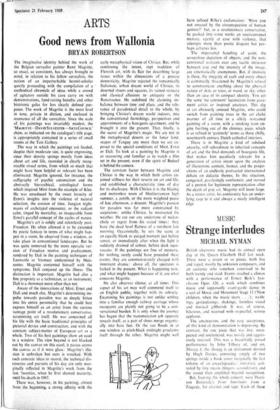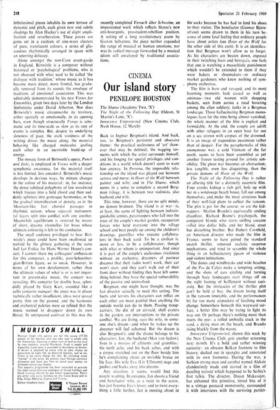Strange interludes MUSIC
mica AEL NYMAN British electronic music had its annual open day at the Queen Elizabeth Hall last week. There were a dozen or so pieces, both live and taped, mostly by unknown composers, and an audience who somehow contrived to be both trendy and staid; Events reached a climax with a performance of Ernest Berk's Syn- c/twine Opus 120, a work which combines music and supposedly avant-garde dance in a sort of Music and Movement Stage 13 ('Now children, when the music starts . . .'): writh- ings, gesticulatings, shakings; formless visual and musical gibberish. It was, of course, hilarious, and received with respectful, serious applause.
The amateurism, and the easy acceptance, of this kind of demonstration is depressing. By contrast, the one piece that was live, unex- pected and uncluttered, was noisily and aggres- sively received. This was a beautifully poised performance by John Tilbury of, and on, Shozyg 1; the shozyg is an instrument devised by Hugh Davies, consisting simply of two springs inside a book cover (originally the last volume of an encyclopaedia: suo-zvu), acti- vated by tiny means (fingers, screwdriver), and the sound then amplified beyond recognition.
But, framing the whole concert, were Harri- son Birtwistle's Four Interludes from a Tragedy, for clarinet and tape. Each of these
infinitesimal pieces inhabits its own terrace of dynamic and pitch, each given new and subtle shadings by Alan Hacker's use of slight ampli- fication and reverberation. These pieces are gems set in a cushion of sine-wave clusters of pure, translucent colours, a series of glis- sandoes rhythmically arranged in space with an unerring delicacy.
Alone amongst the non-Cave avant-garde in England, Birtwistle is a composer without historical or 'psychological' problems, who is not obsessed with what used to be called 'the dialogue with tradition,' whose music as it has become more direct, more frontal, has gradu- ally removed from its sounds the envelope of tradition, of emotional association. This was admirably demonstrated by his new Verses for Ensembles, given two days later by the London Sinfonietta under David Atherton. Nor does Birtwistle's music circumscribe its territory, either spatially or emotionally, in its opening bars, even though structurally Verses is sche- matic and its time-scale as slow as its rate of events is complex. But, despite its underlying slowness of pace, the stark vividness of the writing drives the music along, the material behaving like charged molecules jostling each other in an inevitable build-up of energy.
The mosaic form of Birtwistle's opera, Punch and Judy, is employed in Verses with a deeper symphonic awareness, for the material itself is less limited, less anecdotal. Birtwistle's music develops in devious ways, by minute changes in the colour of his material: in, for instance, the dense subdued polyphony of low woodwind which freezes into a held chord and then sud- denly splinters into grotesque harmonics; or by the gradual intensification of density, as in the Messiacn-like fast chordal passages in rhythmic unison, whose separate instrumen- tal layers spin into conflict with one another. Meanwhile equilibrium is restored by means of short, dreamy ritornellos for brass whose ultimate colouring is left to the conductor.
The small audience privileged to hear Birt- wistle's piece could have been swallowed up tenfold by the glittery gathering at the same hall last Friday for Hans Werner Henze's con- cert. I cannot share my colleagues' enthusiasm for this composer, a prolific, post-Schoenber- gian-Britten figure, so to sneak. However, in terms of his own development, rather than the ultimate values of what is or is not impor- tant in present-day music, the concert was revealing. His concerto for double bass, splen- didly played by Gary Karr, sounded like a cello concerto manqué; the piece was in places technically rather insufficient, ideas were spread pretty thin on the ground, and the harmonic and orchestral palettes were so refined that the music seemed to disappear down its own throat. In unexpected contrast to this was the recently completed Yersuch fiber Schweine, an impassioned work which reflects Henze's new anti-bourgeois, pro-student-rebellion position. A setting of a long revolutionary poem by Gaston Salvatore, the piece neither expanded the range of musical or human emotions, nor was its radical message forwarded by a musical idiom still enveloped by traditional associa- tions.



































 Previous page
Previous page